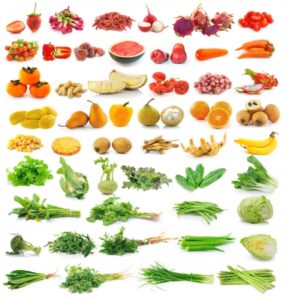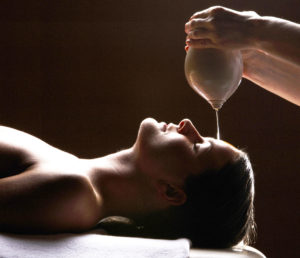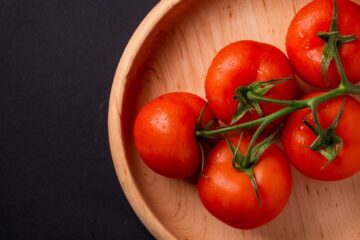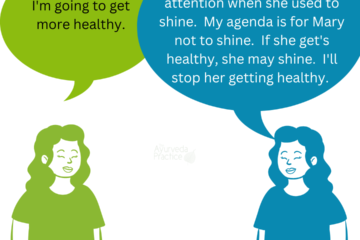Thankfully the menopause is getting a lot of airtime now, and so it should. It has been a source of shame and misunderstanding for too long. How do we view the menopause in Ayurveda?
Menopause essentials
Let’s first recap the menopause essentials. The accepted definition of the menopause is the day that a woman has not had a period for 12 months. The postmenopause starts the day after the menopause. The perimenopause is the time leading up to that when hormonal changes start to occur and women may notice changes in their cycles and the way their minds and bodies work . Women usually start to notice changes during their 40s, although they can happen earlier.
Menopause is a lifestage transition
In Ayurveda, we see that different dosha (combination of fundamental elements) dominate different life stages.

Different stages of our lives are deeply influenced by each of the three dosha. The peri-menopause takes place roughly at the end of the pitta time of life, a period of activity and achievement in the world. The postmenopause is roughly at the beginning of the vata stage of life, a more reflective period of grace and wisdom. The menopause is the junction of the life stages. Junctions of seasons are a time of flux for the dosha, and this holds true for junctions of life stages too. The more balanced we are going into this life junction, the smoother the transition will be. For a woman to get the most out of this time, she needs perspective and preparation.
If you look at menopause in this way, you can see that it isn’t an illness or something to be banished, but a natural transition that we need to be aware of and attuned to. If we are out of balance as we transition through this period, this will show up in signs and symptoms such as:
- Vata: mood swings, anxiety, memory loss, insomnia, constipation, reduced bone density, dry skin and mucous membranes (including vagina).
- Pitta: heavy bleeding during perimenopause, anger, high blood pressure, excessive irritability, skin rashes and hot flushes.
- Kapha: weight gain, fluid retention, depression, lethargy and feelings of mental and physical heaviness.
The most important thing for this stage in life is that the more balanced your dosha are going into this life-stage junction, the smoother it will be. In a woman’s 40’s, it is ideal to start taking stock of health and addressing diet and lifestyle to bring about balance. For a lot of women at this age, vata will be the main trouble-maker so it is always important to concentrate on reducing vata.
Tips for a healthy menopause
Here are some specific tips for a healthy menopause to follow, in addition to those for generally maintaining your health.
Balance your dosha
Firstly, if you recognise any of the signs and symptoms of particular dosha imbalance as listed above, you would be wise to also follow guidelines to reduce that dosha. Seek out a qualified Ayurvedic practitioner (category A or B from the Ayurvedic Professionals Association) for personalised guidance.
Nutritious foods
Some foods which balance oestrogen are cruciferous vegetables (e.g. broccoli, cauliflower, brussels sprouts and cabbage); the allium family (garlic, onions, chives and leeks); fermented foods (sauerkraut, kimchi, kombucha, kefir, natural yoghurt) and a rainbow of fruits and vegetables. If you have high vata, you may want to concentrate on the alliums and fermented foods whereas with high pitta, you’d want to focus more on the cruciferous vegetables. High kapha are fine with a mix of both of these.
As hormones such as oestrogen and progesterone are made from fats, it is important to have enough of them in your diet and make sure they are healthy fats (see here). Menopause particularly is not a time to reduce fats in your diet. Also important are lentils, tofu and tempeh, which contain appreciable amounts of phytoestrogens that help balance oestrogen-progesterone levels; all mushrooms also regulate oestrogen levels, as well as lignans such as in freshly-ground flaxseed and sesame seeds. Avoid heavy, difficult-to-digest foods which overload the liver which is vital for hormonal health. Sugar also plays havoc with hormones so eliminate any white sugar. A 2018 study looked at how diet influenced the age of menopause and found a high intake of oily fish and fresh legumes were associated with a significantly later onset of natural menopause. Refined pasta and rice were associated with earlier menopause, supporting recommendations such as the above.
Manage stress with lifestyle
Rest and sleep are essential as well as managing stress with yoga, meditation and of course the Ayurvedic favourite, warm oil massage. When women are stressed, the body’s resources that should be used for making sex-hormones such as oestrogen and progesterone are diverted towards making stress hormones (adrenalin and cortisol). Women often notice that the surge of adrenaline caused by stress can directly trigger some of the unpleasant symptoms of perimenopause, such as hot flushes and irritability. Manage stress with plenty of rest and practices such as yoga and meditation.
Supportive herbs
A good Ayurvedic practitioner will be able advise you on the best herbs to support you through the menopause. Some of my favourites are shatavari, aloe vera, licorice, lemon balm, valerian and sage but as with all herbs, do be aware of suitability for you and any contraindications (for example, no shatavari with fibrocystic breasts or a history of oestrogenic breast cancer).
Don’t fear it but do respect it
With the ocean, we don’t spend our lives fearing it, but we know that to enjoy it we mustn’t underestimate its power and we treat it with respect. Likewise with the menopause. Don’t live in fear of it but treat your time approaching it with care and attention and the transition to wise elder will be smooth and enjoyable.







1 Comment
Vedic Karma · July 22, 2023 at 06:26
I appreciate the effort and passion you put into crafting each blog post, and it is evident that you genuinely care about your readers’ growth and well-being. Your blog has become a go-to resource for me, and I eagerly look forward to each new piece you publish